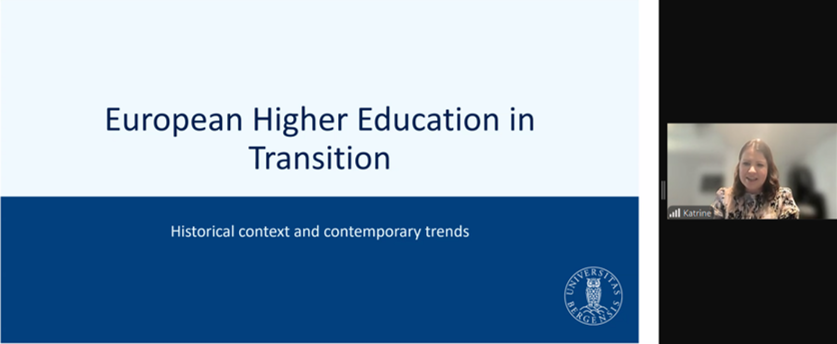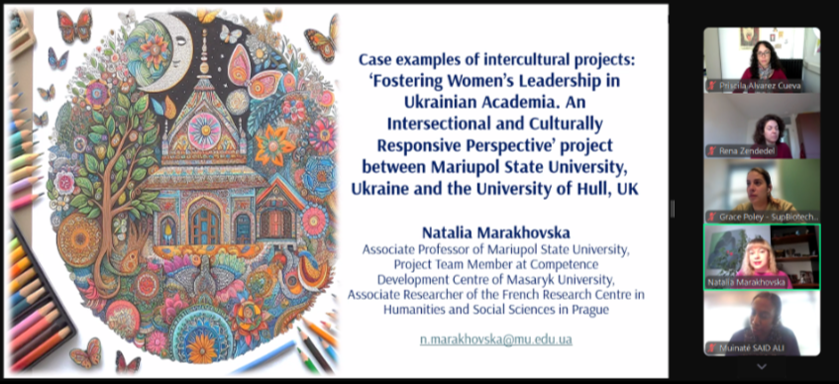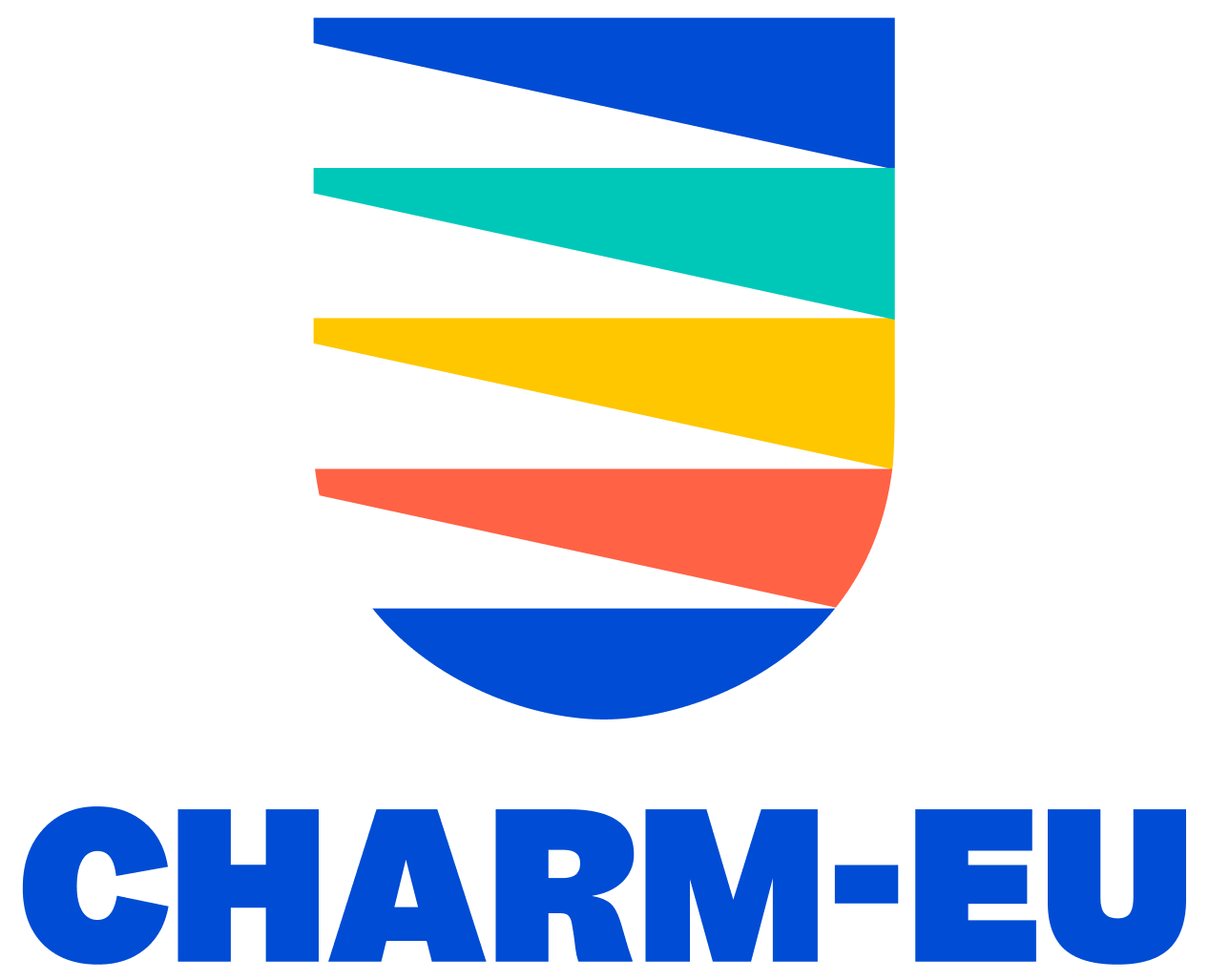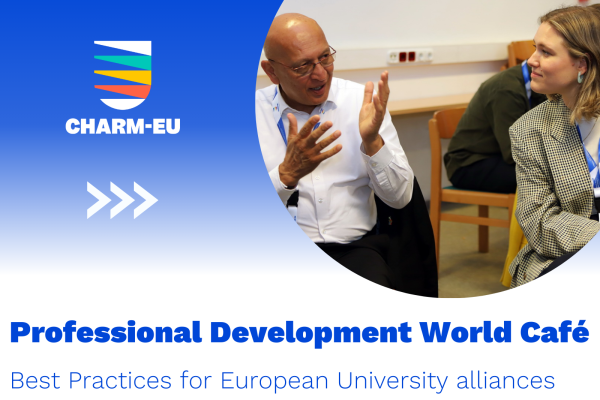The World Café provides participants with a valuable opportunity to share experiences and exchange ideas with colleagues, fostering a collaborative atmosphere. Discussions underscore the transformative potential of innovative teaching methodologies in modern higher education, as well as the immense possibilities offered by AI to enhance learning and teaching for both educators and students. Interculturality is presented as a means of promoting exchanges and understanding between people. Participants also agree on the importance of gathering data to support professional development and explore strategies to effectively engage academic staff in education for sustainable development.
In the closing part of the meeting participants shared some reflections and exchanged contact details on the MIRO board. A short evaluation led to the insights that participants valued the engaging discussions and shared experiences in the breakout rooms and they liked meeting new people and establishing valuable contacts.
“Thank you so much for the opportunity to share our experience but also to benefit from the exchange with colleagues from all over Europe. Wonderful initiative, and we look forward to attending your next event. We got so many great ideas.” – Rada Mogliacci, Université Gustave Eiffel, PIONEER Alliance

Opening | Keynote by Katrine Moland Hansen (UiB)
Katrine Moland Hansen from the University of Bergen delivered the opening keynote, tracing the evolution of European higher education policies. She highlighted Jacques Delors’ vision, describing it as adding “a soul to the European Union,” and discussed milestones like the Erasmus program and the proposed “fifth freedom”—the free movement of knowledge. Hansen addressed challenges such as slow economic growth, demographic shifts, and the need for greater investment in education, research, and skills. She also outlined initiatives like the European Degree and Quality Assurance frameworks aimed at enhancing cross-border cooperation and innovation. While funding has increased, she noted the need to balance national priorities, legal reforms, and EU integration to achieve transformative goals. Her presentation provided valuable context for the World Café discussions.
Breakout sessions
Each breakout room started with several 5 min. presentations by the speakers, followed by an interactive discussion with the participants. Important tools, documents and links were shared among each other on a MIRO board.
Breakout 1: Innovative Teaching Methods and Learning Environments
During the session “Innovative Teaching Methods and Learning Environments”, K. Niewalda (Julius-Maximilians-Universität Würzburg, Germany) and A. Granberg (Abo Akademi University, Finland) presented the CHARM-EU hybrid classroom model, an insightful case study on hybrid classroom teaching within the CHARM-EU alliance. Their talk highlighted innovative strategies and practical experiences in hybrid-format learning environments to enhance student engagement and educational outcomes. Complementing this, R.M. Gray (University of Bergen, Norway) delivered an engaging presentation on “Writerly Teaching and Learning,” exploring the concept of fostering a writerly approach, which links teaching and learning “together in a single signifying process.” These presentations underscored the transformative potential of innovative teaching methodologies in modern higher education and evoke a vivid discussion among the session participants.
Breakout 2: Digital Transformation in Education
The session “Digital Transformation in Education” explored the transformative role of AI and data-driven approaches in modern teaching and learning. Through a series of vibrant discussions and case studies, participants delved into transdisciplinary activities involving spatial data mapping, pedagogy, and linguistic studies. Nataliia Lazebna (Julius-Maximilians-Universität Würzburg, Germany) shared insights from a case study on data-driven methodologies in a Foreign Language Methodology class at JMU. Davitze Könning (Utrecht University, Netherlands) highlighted the integration of generative AI into teacher professional development and policy-making. Ana Elena Schalk (Trinity College Dublin, Ireland) presented an open course on leveraging GenAI in teaching and learning within higher education, emphasizing its immense potential for educators and students alike. The session concluded with the thought-provoking statement: “AI in Need is a Friend Indeed,” underscoring the pivotal role AI can play in enriching education at all levels.

Breakout 3: Intercultural Competences and Inclusive education
The session on “Intercultural Competences and Inclusive Education” showcased various initiatives and methods aimed at fostering cultural understanding and resilience in education. Natalia Marakhovska (Mariupol State University, Ukraine; Masaryk University, Czech Republic) presented case examples such as ‘Fostering Women’s Leadership in Ukrainian Academia’ and an intercultural project between Mariupol State University and the University of Hull, UK, which applied an intersectional and culturally responsive perspective. Rena Zendendel (Utrecht University, Netherlands) and Pricila Álvarez Cueva (University of Barcelona, Spain) discussed the design of an online module to enhance student intercultural competences, with a specific focus on Erasmus students and displaced educators teaching abroad due to war. The session highlighted interculturality as a tool for promoting exchanges, fostering mutual understanding, and empowering individuals in challenging contexts. Discussions also explored models and methods like the DIVE model, visual art, and slow-looking techniques, emphasizing the pivotal role of institutions as enablers and the significance of teachers’ positionality in addressing these topics effectively.
Breakout 4: Professional Development in Higher Education
The session “Professional Development in Higher Education” brought together diverse perspectives on supporting and enhancing the growth of educators within university alliances. Silvia Gallagher (Trinity College Dublin, Ireland) presented an exploratory literature review that emphasized the benefits of inter-institutional collaborations for professional development, drawing on examples from CHARM-EU. Rada Mogliacci (University Gustave Eiffel, France) showcased the innovative practices of the Centre for Innovation in Teaching and Learning (CIPEN), including interviewing new teaching staff and utilising student data to inform development activities. Dr. Lilia Bespalaya (Oxford University, UK; Europaeum Alliance) highlighted fellowship programmes as a pathway to professional growth. Discussions revolved around critical questions such as how to help new teachers transition beyond the “fight or flight” response at the start of their careers, how to integrate them into educational communities, and how to recognize and reward professional development efforts. Participants emphasized the importance of data-driven strategies and reflective practices to cultivate teaching excellence and foster long-term growth.
Breakout 5: Sustainability in Higher Education
The session “Transnational and Sustainable Education” highlighted innovative approaches to integrating sustainability and transnational collaboration into higher education. Mirne van der Cammen (Utrecht University, Netherlands) introduced CHARM-EU’s transnational online learning course catalogue, while Yuanfei Huang (University of Montpellier, France) showcased a challenge-based blended intensive programme focused on sustainable development. Maria Theresa Dömling (Julius-Maximilians-Universität Würzburg, Germany) presented the WueLAB Sustainability Laboratory, which, among other things, supports all members of the university with the format “Transformation experiments” to implement sustainability ideas in a science-based and transdisciplinary way. Caitríona Ní Shé (Trinity College Dublin, Ireland) shared strategies for supporting academic staff in embedding education for sustainable development (ESD) principles into curricula. Judith Goris (University of Gent, Belgium) sparked discussions on ENLIGHT Alliance’s virtual mobility offerings, providing students with diverse international learning opportunities.
The discussions centered on practical aspects, such as organizing platforms for virtual learning, engaging academic staff in ESD initiatives, and fostering active student participation in sustainability-driven projects. The examples inspired participants by demonstrating how sustainability can be seamlessly integrated into education to contribute to the SDGs while developing essential skills in students.
Reflecting on the broader event, Natalia Marakhovska (Mariupol State University, Ukraine; Masaryk University, Czech Republic) expressed her enthusiasm: “I had a fantastic time at the World Café: Best practices for European University alliances in Professional Development, organised by CHARM-EU! It was intellectually enriching to connect with 72 participants from 16 European Universities and discuss innovative strategies for higher education. […] I had the opportunity to showcase examples of successful intercultural projects, in particular my collaboration with the University of Hull, Masaryk University, and the French Research Centre in Humanities and Social Science in Prague. I am very grateful to Dr. Nataliia Lazebna and her colleagues for their leadership and professionalism organising such an amazing event. I look forward to future cooperation and shaping the future of higher education together!”
Closing and reflections
For future online events with this newly established community, participants expressed interest in submitting questions beforehand, dedicating more time to interactive discussions, and exploring a broader range of overlapping thematic topics.
The first-ever online World Café provided valuable insights into best practices for professional development within European University Alliances. Its success has prompted CHARM-EU to consider hosting this event every semester—a testament to the importance of these collaborative exchanges.
A heartfelt thanks to all the presenters and participants for making this event such a success!

